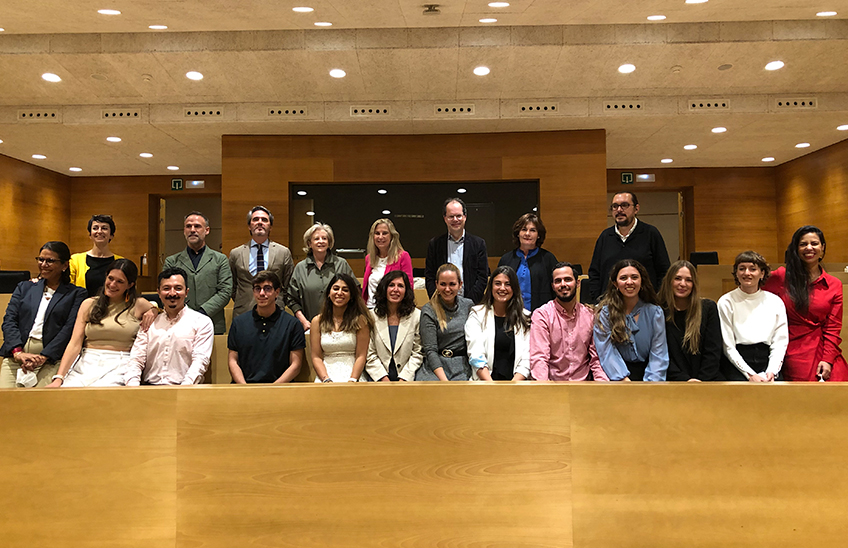The collector and patron Patricia Phelps de Cisneros, at the MUN: "the model that the museum has developed to unite theory and practice is exemplary".
The founder of the Patricia Phelps de Cisneros Collection visited the Museum to participate in the defense of the Master's Thesis of the Master in Curatorial Studies.

PhotoManuelCastells/
11 | 10 | 2021
Venezuelan collector Patricia Phelps de Cisneros, founder of the Patricia Phelps de Cisneros Collection, visited the Museum to participate in the defense of the Master's Thesis of the Master in Curatorial Studies. Master in Curatorial Studies of the center. The projects presented by the already graduated students were based on pieces from the collection that the collector donated to the Museum at the end of 2018.
At the meeting, Phelps de Cisneros said she was "delighted with the work done by the museum and the students. The relationship between art, museum and academia is fundamental. We learn a lot from art: to think, to feel, to communicate, and it seems to me that the model developed by Museo Universidad de Navarra to unite theory and practice is exemplary".
In that sense, he stresses that "art is, above all, a space for freedom and critical thinking, something that society always needs in order to grow and develop. I am delighted to think that the young people who come to study at the University of Navarra will have this Museum at hand, and that they will take advantage of the opportunity to broaden their knowledge and perspectives through contact with art."
Regarding the donation to the Museum of works of Latin American photography from its Collection, he recalls that they chose this destination for the pieces because it is a Museum that "uses its collection for training and education. At the Fundación Cisneros we have always worked with university museums such as Harvard, University of Texas, Hunter College and Wheaton College, among others, but this is not so common in Spain, so we thought it was very important to support this initiative. Time has confirmed to us that this is an exceptional museum in its educational mission".
The 13 students of the 4th edition of this postgraduate course, from 7 countries, started classes on October 1st.
PHILANTHROPY AND BUSINESS
As for her work as a collector and patron, Phelps de Cisneros notes that both she and her husband believe that "philanthropy and business should go hand in hand": "That conviction has guided us at the Fundación Cisneros for four decades now. We believe that the private and public sectors must work together in a common mission to support artists and institutions.
For example, in the 1970s and 1980s, they promoted an important literacy program in Venezuela (ACUDE) that helped tens of thousands of people through radio and LP records. With the support of new technologies, they later created Cl@se, a free Ibero-American channel that reached millions of schools and homes. Likewise, the birth of the Internet enabled them to develop the Actualización de Maestros en Educación (AME) initiative. "We have always been interested in using technology to reach the greatest number of people with quality content, and always in the Ibero-American context, where education is not always a priority for governments," he says.
4TH PROMOTION MCS
After the closing of the 3rd promotion with the defense of the works, and while waiting to know the project selected to become a reality in the halls of the Museum, as an exhibition within the programming of the next course, last Friday, the 13 students of the 4th Promotion of the Master in Curatorial Studies of the Museum began their classes. The students, who come from 7 countries, will receive theoretical and practical training during the postgraduate course, based on the philosophy of learning by doing , under the guidance of professionals from the sector and professionals from the UNAV. This is the only official master's degree in curatorial studies in Spain developed within the framework of a museum, which also provides the participants with the added value of having the services of the University campus and the coexistence of the group with the university community.